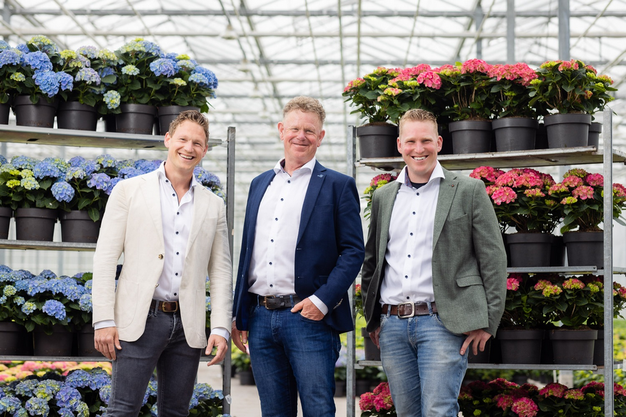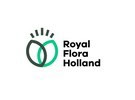How is the new generation of growers coping with the increasingly internationalizing ornamental plant market? Roel van Schie is the operations director at Sjaak van Schie B.V., a company that grows pothortensias. He recently moved to Portugal with his family. "The market in the Netherlands alone is too small for our ambition: to work on a strong, future-proof hydrangea."
You, your brother and a director from outside the family took over the daily management of the company from your father after more than forty-five years. What are your main challenges?
"Our cultivation takes a relatively long time. Breeding takes six to eight years. And then it takes another two to three years until the product is ready for the consumer. That's why a good view of the future is indispensable. We have to look far ahead. For example, to make a good estimate of the market in which our plants will end up after the cultivation process and how we want to deal with that as a company. We are constantly working on forecasts. But, as with forecasts, you can be right or wrong. So it's always: predict, adjust, and make plans, and then the whole thing all over again. That makes it sometimes a challenge to respond flexibly to rapid market developments."
What role does internationalization have in your operations?
"Internationalization is an important part of our long-term vision. With Sjaak van Schie, we focus on the European market and England. We moved production to Portugal years ago. On costs, it is difficult to compete with the Netherlands. And those costs are rising faster in the Netherlands than in Portugal. So logically, for expansion, we focus more on our location in Portugal than in the Netherlands."
 Mike, Schaak and Roel
Mike, Schaak and Roel
What do you run into with an international approach?
"I think as a grower you have to make a well-considered choice. Just working internationally without thinking is not a good idea. Consider for yourself: production abroad is cheaper and better in terms of regulations, but will it also make me happy? We made that assessment years ago. But it is still sometimes a search. In Portugal we now work more and more with local people, instead of expats from the Netherlands. Then you suddenly notice that there are still cultural differences. The Dutch are much more direct, you know immediately what to expect. With the Portuguese you often have to ask more questions to get to the point. The Dutch generally want to plan their own work, and to be given responsibility. This is different with the Portuguese: they value a hierarchical culture more and like it when you tell them what to do. In the end, the benefits outweigh the benefits for us. We now work with local talent, and with people who are rooted in the area. It puts us even better in touch with the Portuguese market and we integrate more easily as a company. That, in turn, helps us in our growth plans for our location here."
How is Royal FloraHolland helping with this?
"Royal FloraHolland is an indispensable ornamental plant marketplace for us in this respect. For day trade, and to showcase our products. Floriday contributes to that. We only grow hydrangeas, and there's no place in the world where you get such a complete picture for buyers of everything the ornamental horticulture sector has to offer. It's also nice that you stand strong together. Royal FloraHolland lobbies for the interests of the sector. Extremely important, for example during corona. And the floriculture marketplace connects growers with each other. To share knowledge and to jointly contribute to the promotion of a product, for example. It is important that Royal FloraHolland keeps a close eye on added value and costs. Get rid of loss-making services faster, I would say. And invest in Floriday."
What makes your international approach innovative?
"We also operate outside Europe, but from HiBreeding. That is a joint venture between Sjaak van Schie and The Mastergrowers. From this company we focus on genetics: we develop new, strong varieties. We breed new varieties and market them internationally. Our idea is always: local for local. So instead of selling adult plants directly to Asian or American customers, we sell genetics from HiBreeding including our knowledge to selected growers there. Such a distant market is almost impossible to penetrate as a European grower. The question is whether that would make you happy. But with our strong and innovative seedlings and a network of breeders who know their own local market, it works. For example, we have been working with a grower in Uganda for some time, and now we are also targeting the United States. Hydrangea is incredibly popular with Americans."
For more information:
Royal FloraHolland
www.royalfloraholland.com










